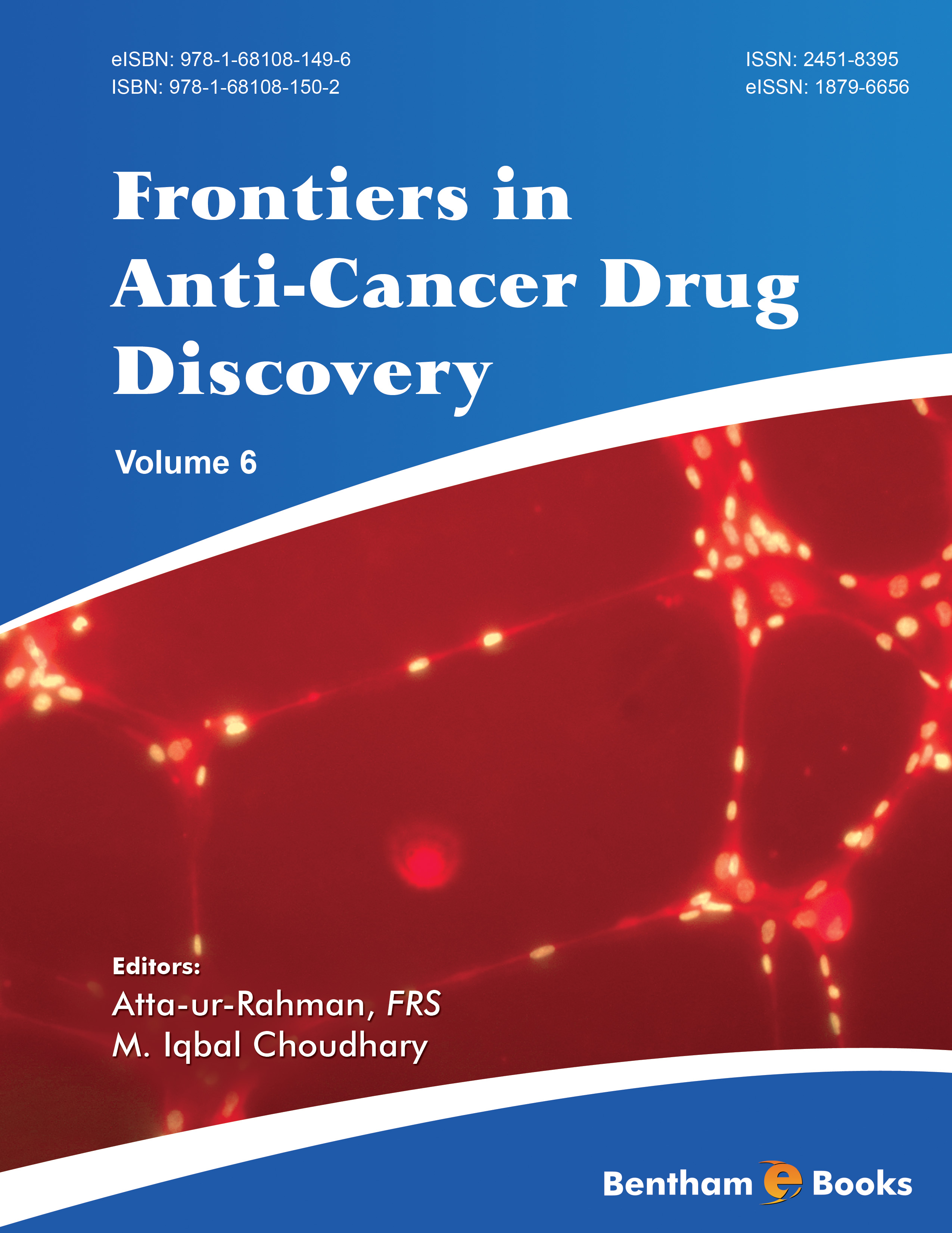Vol. 6 of the eBook series “Frontiers in Anti-Cancer Drug Discovery” comprises seven articles written by the leading researchers in this field. This volume is an excellent blend of well written articles in broad fields of search on new molecular targets in various cancers, and on the discovery and development of innovative anti-cancer therapies.
Cancer cells depend on glycolysis for energy as well as for biosynthetic intermediate production. Since they have high glycolytic rates, they upregulate glucose transporters and lactate transporters. The importance of monocarboxylate transporter isoforms I and II (MCT) has been recognized in mediating in the process of lactate efflux from cancer cells, facilitating the maintenance of high glycolytic rates, and aiding in the regulation of intracellular pH via a proton symport mechanism. As a result, MCT has emerged as a therapeutic target for anti-cancer therapy. In the first chapter by Pinheiro e al. discuss the metabolic reprogramming of cancer cells in this context.
In chapter 2, Carrillo et al. discuss the use of interferon α-2b (IFN α-2b) as a therapy in treatment of certain carcinomas. The treatment causes an oxidative stress which fortifies the relationship between FOXO (Forkhead box class proteins) and β-catenin, and thus inhibits its interaction with the TCF in hepatocellular carcinoma (HCC). This impairment of the formation of β-catenin/TCF4 complex promotes apoptosis and slows down the oncogenesis process.
Yokoyama et al. have used a stem model to understand the relationship between the hypoxia and cell proliferation in an attempt to identify new targets for anti-cancer therapies. Hypoxia induces the production of HIFs (Hypoxia induced factors) which help the stem cells to reprogram the cell growth and survival strategies. Similar hypoxic control also occurs in cancer cells. In chapter 3 they discuss the current state of knowledge about the role of oxidative and hypoxic stress in cell reprogramming and the implication of hypoxic regulation and ROS production in cancer progression.
Natural products have played pivotal role in the discovery and development of drugs throughout history. A large number of currently used antibiotics and anti-cancer drugs are natural products or their analogues. Anthracyclines, natural products derived from Streptomyces, are among the most effective anticancer drugs ever developed. They have been used for the treatment of various cancers including, lymphomas, leukemia, breast, uterine, ovarian, bladder, and lung cancers. However, this class of drugs has relative merits and demerits. Mazur and Opydo-Chanek, in chapter 4, present a comprehensive review on various strategies developed in the recent past to improve the efficacy of anthracycline drugs, and to reduce the adverse effects associated with their use. They conclude that anthracycline anticancer agents have a great future, provided that their efficacy and safety profile is improved through systematic research.
Terpenoids or terpenes are largest group of natural products, found in higher and lower plants, marine organisms, and other organisms. They are widely known for their biological activities. Terpenes, including essential oils, manifest their anti-cancer activity through multiple mechanisms, including microtubule stabilization or natural inhibitors of inflammatory pathways.
Heras and Hortelano in chapter 5 review the anti-tumor activity of various diverse classes of terpenoids that are in various stages of development.
Biological therapy of advanced liver cancer, called hepatocellular carcinoma (HCC), holds special promise. HCC is among the most common malignancies, associated with a very high mortality rate. Current treatments of HCC, such as surgical resection, liver transplantation, and radiofrequency ablation, are far from perfect and prognosis is particularly very poor at the advanced stages of HCC. Shibolet et al. review the current therapy choices for advanced stage HCC in chapter 6, including emerging chemotherapies, and new biological therapies.
In the last chapter Alphandery has contributed an interesting review on the use of iron oxide nanoparticles, called bacterial magnetosomes (BM), in the treatment of various kinds of tumors. Magnetosomes are extracted from magnetostatic bacteria which are grown in special conditions. BMs have been proven to be useful in pre-clinical studies against breast cancer. These nanoparticles are heated by applying an alternating current, which eradicates tumor cells. Recent work in this field is comprehensively reviewed in this article.
We would like to express our gratitude to all the authors for their excellent contributions. We also wish to thank the entire team of the Bentham Science Publishers, particularly Ms. Fariya Zulfiqar (Assistant Manager Publications), Mr. Shehzad Naqvi (Senior Manager Publications) and team leader Mr. Mahmood Alam (Director Publications) for their efficient handling of this book at all stages of its publication. We are confident that this volume of the eBook series will receive wide appreciation, both from researchers as well as from health professionals.
Prof. Atta-ur-Rahman, FRS
Honorary Life Fellow
Kings College
University of Cambridge
UK
Prof. M. Iqbal Choudhary
H.E.J. Research Institute of Chemistry
International Center for Chemical and Biological Sciences
University of Karachi
Pakistan

